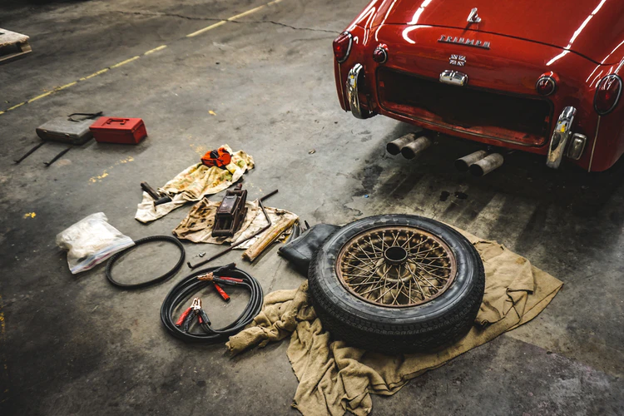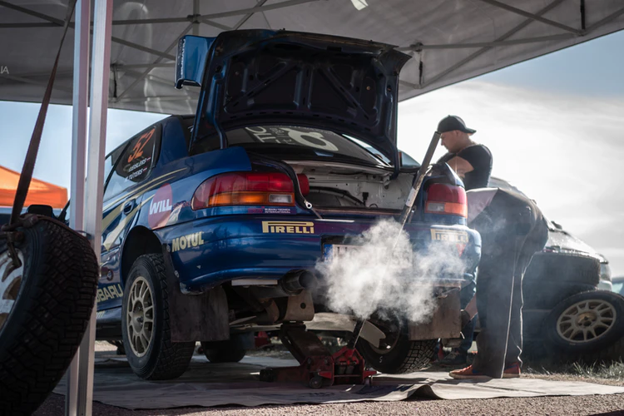10 Tips for Maintaining Your Car

Getting your very first car is exciting and it gives you endless possibilities – you can go on trips more often, say goodbye to cramped commutes, and do your errands easily whenever you want. But like most things, the car should also be taken care of, cleaned, and properly maintained to last long and provide optimal performance.
While most car maintenance should be done by a professional and in a proper shop, you should also know how to maintain your car whenever you’re out on the open road. If you want to learn more about tips for car care and simple car maintenance, continue reading!

Why It’s Important to Take Care of Your Car
Your vehicle costs thousands of dollars, isn’t it only right to prolong its life with proper upkeep? Maintaining your car will extend its expected lifespan, and this doesn’t only end with simple interior vacuuming or monthly car washing, it should always be checked properly and see if there are any problems. The common mistake people make is that they wait for problems to arise before going to the shop to have it checked.
Aside from prolonging the lifespan of your car, it will also make it safer for you and your passengers. While it does make the car safer, proper car maintenance can also make its upkeep cheaper in the long run – saving you both time and money.
Here’s how you can take care of your car better:
Tips for Basic Car Maintenance
While you probably had no idea how to maintain your car before you bought it, there are easy ways you can properly handle car maintenance with these easy tips for car care. With the proper tools and the proper habits for the car upkeep, you will be able to perform these basic car maintenance tasks:
1. Monitor Your Car’s Fluids
Keeping the engine oil, power steering liquid, and coolant in check is a simple method to keep up your vehicle’s performance. Check your owner’s manual or ask your specialist to tell you the best way to check your fluid levels and where to pour in more if necessary.
Fluids are comparable to the blood of the automobile. Without specific liquids, expensive repairs will likely be needed. If ever you are religiously adding fluid to your vehicle, you should seek help from a mechanic you trust to get a proper diagnosis.
2. Check the Tire Pressure Regularly
The right tire pressure is important for your car’s maintenance, and to limit the hazard for premature wear and even total tire failures or blowouts. However, tires lose air almost every day and that’s expected. Your vehicle may have a tire pressure warning system that will alert you, but it will only trigger when a tire drops down to a dangerously low-pressure level.
To keep your tires in good condition, check the pressure of all tires (even the spare) once every month and add air if necessary. Check your owner’s manual or search for signage plastered on the car’s door for tire pressure information. Never over inflate your tires, which can be similarly as risky as tires with a lack of air. Proper car maintenance demands proper education, and this means learning more about your car from the roof to tires.
3. Watch for Warning Lights
Modern cars have expanded frameworks of sensors and warning lights that will show you everything from forgetting to screw the gas cap back on after filling up, to indicating that one of the tires is low on air.
Become familiar with every single one of your warning lights means so you know when your car maintenance is due. Your owner’s manual is a reliable source for every problem your car may potentially warn you about. If any of the warning lights become active and you can’t quickly pinpoint and fix the issue, take your vehicle to your mechanic to have it fixed and get them to educate you on why this issue occurred.
4. Inspect Interior & Exterior Lighting
Check your car lighting once per month. Additionally, always refer to your owner’s manual for proper knowledge and tips. This may appear to be basic and instinctive yet every car has some special lighting systems for certain conditions.
For instance, Daytime Running Lamps (DRL) are one of the common types, so understanding when and how they function is important in car maintenance. Replace your bulbs as per your owners manual or manufacturers website, and if you’re unable to do it yourself, take your car into your dealer or mechanic.
5. Listen to Your Car
You can tell a lot about the health of any mechanic devise by the noises they make – Pay close attention to conditions, temperatures, and when the weird sounds start to be heard – your car specialist will ask you these questions so it helps if you can give them accurate answers. Exact or close to accurate answers will be useful in finding and diagnosing any strange noises your car is making.
6. Pay Attention to How Your Car Drives
Check how your car operates when it’s driven normally as this can be another indicator that something is wrong. When you drive your car for a long time, you will get used to it and you will be more sensitive to any new jerks, vibrations, or shudders.
When you’re aware of these new ticks, you will be able to seek help immediately.
7. Assess Your Car from the Outside
Driving can be dangerous if you have no idea what’s wrong with your car, so a proper assessment of the car before hitting the road would be a good habit to have. You should try to do this at least once a week at the least.
Always check for body damage, see if your wiper blades are still good to go, check the tires for wear and tear, and test if all the locks are functional – even the sunroof if you have it. You will need everything in good shape if ever you’ll get into an accident.
8. Keep Your Car Clean
Aside from cosmetic factors, cleaning your car properly is as important as proper car maintenance. This will preserve your car’s lifespan and protect it from premature ageing and rusting.
Car washes can be expensive, a simple car hand wash is one of the basic tips for car care. It removes the film that makes the paint look dull and old. Washing the wheels and tires will prolong its life and will look good on the road. Keep the interior clean from crumbs and debris to avoid the infestation of insects. Remove the leaves stuck and accumulated from vents.
9. Find a Mechanic You Trust
One of the important factors would be to invest in a professional mechanic to check on your car when needed. By sticking to one mechanic, they will be able to know how to maintain your car when it has problems as they’re aware of the car’s history.
10. Reference the Owner’s Manual
Consulting your owner’s manual for abnormal occurrences in your car will help you avoid unnecessary damages in the long run. If you have trouble understanding instructions for car maintenance, always ask a professional.

Advanced Car Maintenance Tips
It’s important to learn basic car maintenance, but going the extra mile can really save you a couple of bucks in the long run. These are common problems that people face, and here are the basic remedies in fixing these problems:
1. Check Your Car’s Air Filter
The car air filter prevents outside dirt and particles from entering the car’s engine. During combustion, your engine needs air and if the filter is clogged, this will severely affect your car’s performance.
The basic car maintenance for filters would be replacing it every year or every time your car reaches 19,000 kms. This can easily be done in your garage within 10 minutes with this nifty guide.
2. Change the Spark Plugs
When you’re having trouble with your car’s performance, the reason behind this would probably be the spark plugs. When it’s neglected, it might slowly wear out and eventually be covered in a buildup. A rule of thumb is: Spark plugs last for 48,000+ kms until they need to be replaced for better performance.
3. Check Your Car’s Battery
You know your battery is dead when the car is in good condition, but not starting. Check your battery and ensure that the cables are connected to its own terminals. Check for leaks or mineral build ups around the cables and the terminals as well.
The proper car battery maintenance would be to clean the cables and the terminals with a brush and even apply dielectric grease when needed. Use a multimeter (make sure the engine is off) and see if the battery is fully charged (it should be around 12.4 to 12.7 volts and when the car is on it’s 13.7 to 14.7 volts).
4. Have Your Tires Rotated & Balanced
This is one of the easiest tricks to learn in car tire maintenance (and could possibly save you a lot of bucks). When you reach about 9000 – 10,000 kms, have the tires rotated as not all tires get worn at the same time. Balance the wear by rotating the rear and the front tires.
Check if your tires are aligned as well – if you don’t align your tires, it will cause problems with steering and the results can be fatal.
5. Get Your Brakes Checked
When the brakes fail, it could be because of the rotors, the brake fluid, the brake pads, and the brake pedal. The usual culprit behind a brake malfunction would be the brake pads or the brake fluid. If you have brake problems, you will likely need to check the brake pads and go under to check the brake fluid reservoir leak.
6. Inspect & Replace Serpentine Belts
When these serpentine belts fail, they will cause a major damage to engine parts and it can easily be avoided by replacing these belts. The ideal way to keep your car in top condition is to replace it after 96,000 kms or check the manual for your model’s requirements.
7. Make Sure the Cooling System is Working
The hoses that carry the engine coolant can be damaged after heat, high-pressure, or simply worn because of age. When the hoses are extremely worn, there will be a leak. The best way to avoid this is to check the coolant yourself.
8. Have Your Car’s Engine Cleaned
Cleaning the engine internally is vital for the car’s performance, but it’s also important to clean the exterior too. Small debris and dust can fall in places and can cause damage to your engine – if grease dripped in with the brake fluid, there will be problems with the brake system.
There are good cleaning agents meant for external engine cleaning that will prolong your engine’s lifespan. It also is a chance to see if there are other problems under the hood that you’re not aware of.
9. Clean Your Car’s Windshields & Replace the Wipers
Clean your windshield properly – this is one of the important car maintenance you need to get used to. Clean it especially before a long road trip and replace the wiper blades if the wiper is too stiff or it makes a lot of noise and scratches.
10. Protect Your Car’s Headlights
A good rule of thumb is to always check your headlights before driving – see if they’re smashed or getting dim. Replacing the headlights is usually easy and it only takes 10 minutes or less. To save yourself the headache – always remember to turn off the headlights when parking.
Conclusion
When you own a car, it’s your responsibility to take good care of it and make sure it’s in optimal condition. By learning simple car maintenance and easy tips for car care, you will be able to save money and enjoy driving without worrying about common road trip problems!

